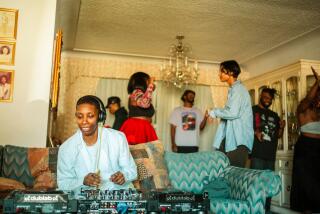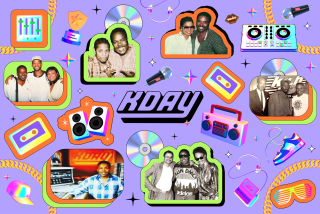For Jamaicans, Radio Days Are Not a Thing of the Past
- Share via
KINGSTON, Jamaica — Like many other Jamaicans, Christopher Castriota spends his afternoons listening to the radio.
But he gets paid for it: As director of community relations at the Ministry of Water, Castriota monitors radio talk shows to find out where taps are dry.
“On many occasions when people have problems with their water, they don’t call the ministry or the water commission,” Castriota says with a sigh. “They jump on the phone and call a talk show!”
It’s not surprising. While other media may rule elsewhere, these are still radio days in Jamaica.
A strong oral tradition brought over by African slaves, low incomes, love of music and distrust of authority are all considered factors in radio’s popularity in Jamaica.
These days, the freewheeling medium increasingly is an outlet for frustrations with politicians’ misdeeds and the government’s inability to stem violence and crime or ease poverty.
“In the field, on the bus, in the office, in cars, in factories, in marketplaces, people listen to the radio all day,” says talk show host Barbara Gloudon. “It is more accessible than the television.”
Popular Announcer Skewers Politicians
The island of about 2.5 million people has 1.9 million radios--the highest ratio in the Caribbean and much higher than in many developed countries. By contrast, government figures show only 330,000 television sets. Newspaper readership is relatively low, and Internet use is limited.
Radio’s power was highlighted during a recent uproar over the political violence of the 1970s, a time when Jamaica’s two main political parties organized and armed residents in poor neighborhoods during a power struggle. A bout of national soul-searching was set in motion when former politicians confessed on the radio to their misdeeds during that era.
“The talk shows have acted like a safety valve. People get to vent their frustrations, whether at the water commission, the condition of the roads or the politicians,” says Aggrey Brown, a communications professor at the University of the West Indies.
Particularly popular is Winston “Baba Tunde” Whitter, who skewers the country’s leaders as corrupt and is the only major radio personality who uses Jamaican “patois” instead of standard English.
“Baba Tunde isn’t caught up in the system,” says Ras George, a dreadlocked, unemployed 42-year-old as he smokes marijuana in a Kingston park. “He speaks for the people.”
Not everyone is impressed with Whitter’s show.
“We are trying to monitor the radio programs for libel and sedition,” says Ralston Smith, an aide to Prime Minister P.J. Patterson. “If it goes into the point of actually inciting rebellion, we’ll have to do something about that.”
Experts say Jamaica’s love affair with radio can be traced to the strong oral tradition among African slaves brought over by the Spanish and British to work on sugar and coffee estates. After emancipation in 1831, news spread among a largely illiterate population by word of mouth.
“The people who could read, such as teachers and clergy, would sit in the town square and read the newspaper reports to people. The radio is an extension of that tradition,” says Berl Francis, a communications consultant.
Jamaica’s first radio station opened in the late 1930s. It was taken over by the British colonial government during World War II and later became a state-run station. In 1959 a second state station was started.
Both state stations started FM music stations in the 1970s, which, aided later by private radio stations set up in the 1980s, helped push local genres like reggae and ska.
Brown says a 1960s radio show called “Teen-age Dance Party” got things going.
It was “a live one-hour program where young people would come on and play their music,” he says. “It really started Jamaican music on its way. We had Jimmy Cliff, Marley and the Wailers. Before that show there was never one place to hear this kind of music.”
Today that music is heard around the world and is ubiquitous here.
But some islanders, like 29-year-old homemaker Lorna Jackson, prefer Jamaica’s equally popular gospel music, on stations like LOVE-FM.
“I get up in the morning and listen to the prayers while I get my kids and husband ready,” she says. “Then I keep it on all day for the music. It’s uplifting.”
More to Read
Sign up for Essential California
The most important California stories and recommendations in your inbox every morning.
You may occasionally receive promotional content from the Los Angeles Times.













